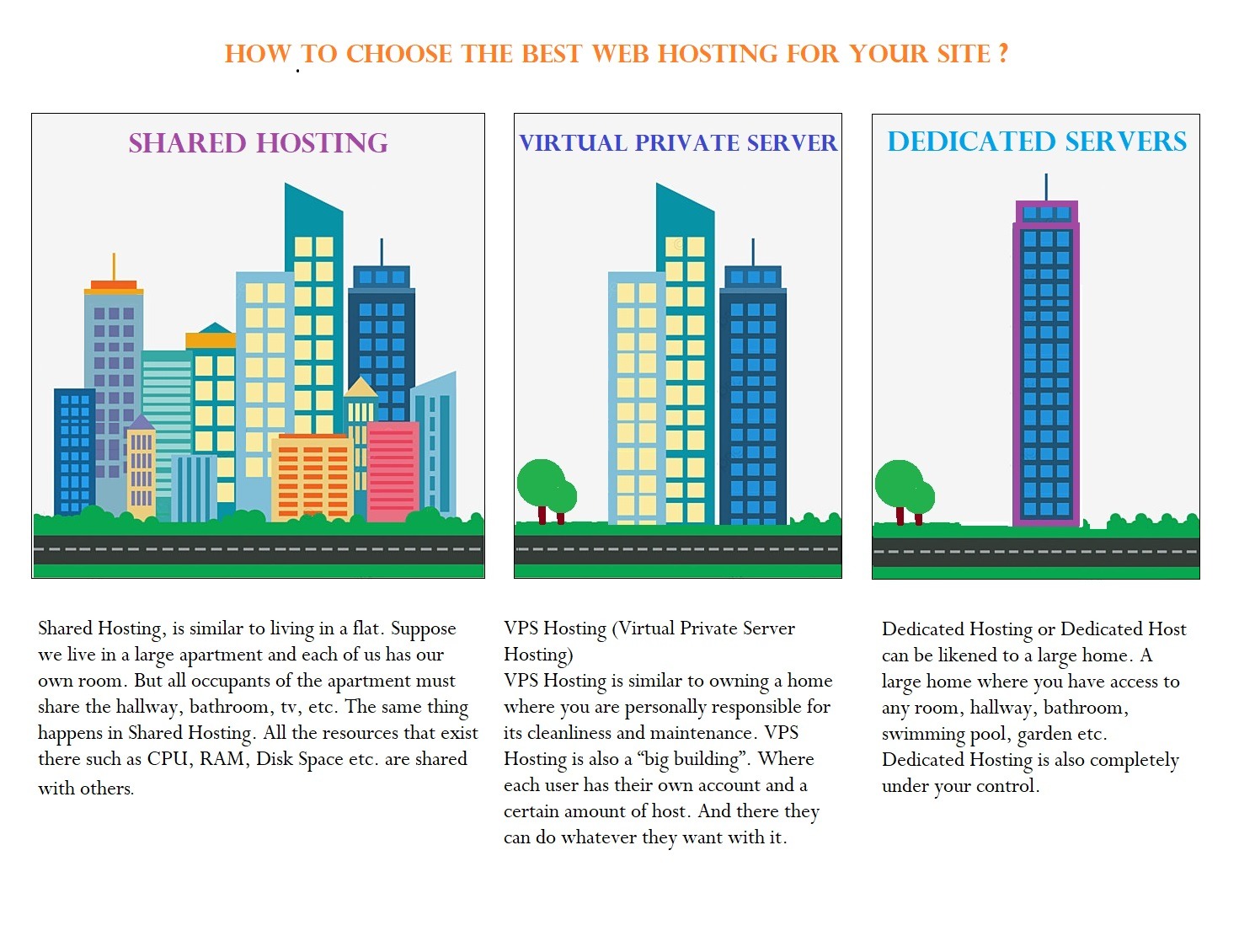Let's Encrypt SSL certificate is provided FREE of charge in all our web hosting packages.
DetailLet's Encrypt SSL certificate is provided FREE of charge in all our web hosting packages.
DetailWhat is a VPS? The term VPS, or Virtual Private Server, can be defined as a virtual machine or container configured to operate as a physical computer under virtualization software on a dedicated server. You would interact with a VPS just as you would a physical, dedicated server.
Read on to better understand VPS hosting and whether it’s the right choice for you:
Here’s a detailed definition of a VPS that explains more about how it works. As mentioned earlier, a VPS works by running its own operating system (OS) in an allotted portion of a physical server’s storage or disk drive space and memory resources such as RAM. This is accomplished with type 1 or 2 kinds of hypervisor software (e.g. Virtuozzo or VirtualBox respectively) which divides the physical server into dozens, sometimes hundreds, of virtual systems.
This gives your VPS most of the same features of a dedicated server, excluding the ability to modify the kernel (most users don’t care to do that anyway). Each VPS hosts its own files, databases, and settings.

If you’re having trouble seeing how it works, think of townhouses. There is one overall physical structure which is broken down into separate units. While the residents technically inhabit and manage their own areas, none of them have access to anyone else’s personal belongings or living space. With townhouses, there are things that have to be shared such as parking space. The same goes for a VPS. Your data is guaranteed to be yours to configure, but some resources such as CPU cores and processing power or SSD storage space are allocated to be shared with others or restricted to make room for others within the physical server.
It’s important to understand your needs before selecting a web hosting plan. We assist our customers with migrating to a different plan, but researching your options can save you a lot of time and energy. Do you need a particular Linux operating system (OS)? Do you need WebHost Manager (WHM) to manage customers with individualized cPanel accounts or domain names? Do you need root access? These are just some of many factors that can help you decide what’s best for you.
The type of web hosting you choose for your business can make or break your website. In a world that demands speed, reliability, and security, you can’t risk having a site that isn’t up to par for visitors. In fact, 47% of consumers expect a webpage to load in 2 seconds or less before they bounce.
This is how VPS hosting can help you keep visitors on site and stay within your budget. It is a cost-effective way for eCommerce “webpreneurs”, startups, and bloggers to gain more processing power than a shared hosting site without the price of a dedicated server.
If your business has grown large enough that you’ve outgrown shared hosting, you might find yourself feeling overwhelmed with the many upgrade options. If you’re the average small business owner or C-level executive, you might not understand the difference between the various options, beyond your website’s base requirements to function.
A VPS server is used for a lot more than a static website in most cases:
Learn more about what you can do with Linux VPS hosting.
To clarify, the main difference between a VPS and Linux is that one is a server platform, while the other is a type of operating system that can be installed on both servers and personal computers. Comparing a VPS to Linux is like comparing Michelin tires to Toyota automobiles, the two are not mutually exclusive and represent distinct aspects of a larger whole. Think of a VPS or computer as the automobile, and the operating system (Linux) as the tires.
This guide focuses on the Linux virtual private server because we’re a Linux web hosting company. However, any operating system (OS) can be installed on a VPS. For example, there are Windows VPS hosting providers. IT / IM college students will likely interact with a virtual Windows instance at some point in their curriculum.
What makes Linux so great? Linux OSs are free, stable, and well supported by so many essential applications today (proprietary and open-source).
You may have seen different VPS product terms during your research:
Though each of the six terms may seem like different products, there are only two in this case: managed and unmanaged. Both products have key differences worth noting.
A managed VPS, sometimes emphasized as “fully” managed VPS, uses pre-installed server administration software on a predetermined OS. It’s usually cPanel, the most popular system administration (sysadmin) software today, on a CentOS server. This is sometimes called cPanel VPS Hosting.
WebHost Manager (WHM) is the application that manages a group of cPanel accounts. The ability to separate sites and applications between cPanel accounts serves various use cases:
There are Linux web hosting companies that use DirectAdmin, or Virtualizor instead.
The other four terms from the above list mean the same thing — there’s no pre-installed software to manage the VPS. It’s unmanaged. The VPS is not restricted to a single application and OS. It’s sometimes called a cloud server because it’s bare and flexible. You’ll usually have the option to “re-OS” the server between at least the latest CentOS, Debian, and Ubuntu long term support (LTS) releases.
Core server management tasks are now your responsibility. But your server requires less resources to provision, deploy and maintain. Therefore, cloud servers generally cost much less than managed VPS hosting plans which include licenses for enterprise software such as cPanel in the cost structure. It requires advanced skills in:
For these reasons, one of the cons of unmanaged VPS hosting is that it’s generally only recommended for users capable of and willing to resolve any issues deemed specific to their VPS setup. That being said, it allows for greater customization and control over the system and is often preferred by experienced web developers and sysadmins.
To learn more, see our article on Managed VPS or Cloud Server Hosting.
For many people, the number one advantage of an affordable VPS is that it offers a lot of the functionality of a dedicated server at a fraction of the cost. It also offers more stability and fewer limits than a shared server since you don’t have to share resources with other companies who are hosted on the same server.
But it also gives you more flexibility and scalability because you can customize them much more. With a shared server, the websites are automatically managed by the web hosting company and you have input but not a lot of actual hands-on control. With a VPS, you can have as little or as much control as you need, allowing you to scale in response to changing compliance demands.
Let’s compare managed VPS, shared, and dedicated web hosting technology.
Shared hosting and VPS hosting are similar in some ways. Both require sharing a physical machine and its resources with other users. Remember our comparison of VPS hosting to a townhouse? Think of shared web hosting as an apartment, and you have roommates. If a roommate takes a long, hot shower, you’ll have to survive a cold one (at least there are health benefits to it). And since you share a physical address with so many people, you’re affected by many others’ actions. But you make it work because it’s cheap and easy to maintain your limited space.
Shared hosting is very much the same. The resources are theoretically shared equally between all users. But if a site uses more than its fair share of bandwidth (intensive MySQL processes, or a massive spike in traffic, for example), it takes away from everyone else. These constraints lead to less consistent performance and potentially lost uptime. Worse for many organizations, if other websites that share your server get classified as “adult” or “spam,” it can hurt your brand’s search engine optimization (SEO) and force your email campaigns into junk folders (unless you’re able to purchase a dedicated IP for your shared hosting plan).
There are many VPS advantages over shared hosting. Imagine having an entire server at an affordable price.
Performance is more consistent because you are allotted your own share of resources. As there are fewer VPS containers per server, you have a greater amount of resources for your websites and databases, ultimately making them able to compute faster. The performance and resource usage of neighboring VPSs doesn’t affect you.
Better SEO and less spam blacklisting issues since you’ll have a dedicated IP address or maybe even multiple addresses. Search engines and email providers won’t mistake you for being associated with X-rated content or phishing history from other VPSs, especially if you improve email authentication.
Root access allows VPS sysadmins to manage services and install complex software that require admin permissions (e.g. Java, MongoDB, and preferred mail server).
Security is higher because the virtualization process protects VPS containers from being affected by cyber attacks to other customers. With root access, administrators can do a lot more to harden VPS and cloud server security.
Virtual private server solutions are a great first step up from shared. Still, many business users prefer shared hosting simply because it is the cheapest alternative and easiest to manage. It’s great for those building their first website or with low resource demands.
Dedicated server hosting provides all the benefits and availability of VPS hosting over shared hosting, but now span an entire isolated physical server. This adds the ability to install whatever Linux OS and hardware you wish. You can also upgrade your Linux kernel and remove unneeded kernel modules at will. If shared hosting is an apartment, and a VPS is a townhouse, a dedicated server is a house.
Users with such configuration needs may supplement their defense-in-depth strategy with a hardware firewall such as the Cisco ASA 5500-X available with our dedicated hosting plans.
However, dedicated hosting is also the most expensive option. This is why virtual private hosting provides an attractive compromise.
Save money because you are sharing the physical server with other VPS customers. Therefore, you only pay for your portion of costs required to keep the physical server running — routine maintenance, hardware upgrades, etc.
Save time setting up your server environment by using a pre-configured OS, and cPanel/WHM if using a managed VPS, that’s optimized for the hosting company’s infrastructure.
“Virtual machine” (VM) is a general term for an OS hosted on a physical machine (hypervisor) in a manner which allows it to act as a lone physical system. Oftentimes “VM hosting” is used as an umbrella keyphrase for different virtualization solutions, primarily virtual private servers. Think about it. An unmanaged VPS is a cloud VM running its own kernel and your OS of choice from a list of vetted VM images. Other examples of virtualization:
In each example the OS or application instances you use are software-defined containers “jailed” in VM software on a physical system you don’t manage.There’s little differentiating VM vs VPS hosting since terms are sometimes used interchangeably for defining a private web server or application. When searching for cloud VM hosting, you’re likely looking for an unmanaged VPS or single-purpose web application hosting. Perfect example: WordPress Hosting, in which you only maintain a WordPress site.
A VPS gives your business room to grow without the restrictions of shared hosting or the cost of dedicated hosting. By upgrading to VPS hosting, you’ll enjoy:
A lot of shared hosting customers upgrade to a managed VPS at some point due to exceeding database resources allotted on previous machines.
Many budget-conscious users who may want a dedicated server settle on a VPS for:
If most of your business is conducted online and your traffic is growing, a VPS could be the perfect solution. VPSExtra Hosting’s VPS hosting is simple, fast, and reliable — giving you and your clients the power and performance you deserve while avoiding downtime.
 Copyright © 2025 All Rights Reserved
Copyright © 2025 All Rights Reserved
 Worldwide (English)
Worldwide (English) Romania (Romanian)
Romania (Romanian) Spain (Spanish)
Spain (Spanish) Germany (German)
Germany (German) France (French)
France (French) Bulgaria (Bulgarian)
Bulgaria (Bulgarian) Indonesia (Indonesian)
Indonesia (Indonesian) Portugal (Portuguese)
Portugal (Portuguese) South Africa (Zulu)
South Africa (Zulu)